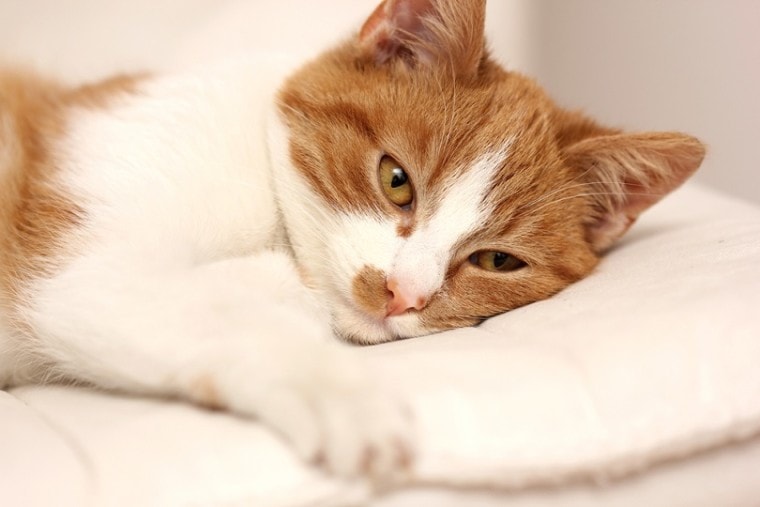
Feline asthma is a lower respiratory tract disease that affects between 1–5% of cats. Triggered by an allergen or stressful situation, the cat’s immune system begins a cascade of inflammatory reactions that results in the constriction of the airways and excessive mucus production. The narrowed space of the airways makes it difficult for air to pass naturally, causing wheezing, difficulty breathing, coughing, hacking, mouth open breathing, rapid breathing, and even vomiting. Asthma can be life-threatening.
Asthma is a progressive disease that cannot be cured, but it does need to be managed.
The traditional treatment of asthma involves the use of corticosteroids and bronchodilators that work in reducing the inflammation of the lungs and helping the bronchi or lung airways to expand back to their natural diameter.
There are natural remedies to help prevent asthmatic flare-ups and manage mild asthmatic reactions. This article goes over 11 of those remedies that could help your asthmatic cat.
The 11 Natural Remedies for Cat Asthma
1. Stress Management
Stress is a well-recognized asthma trigger for individuals suffering from the condition. If you have an asthmatic cat, avoiding stressful situations such as other pets, kids, and loud noises will go a long way in preventing an asthmatic attack. Remember that cats are creatures of habit, and small changes cause them stress. So, if you need to change their diet, routine, or even rearrange the home furniture it is safer to do it gradually.
A pro tip is to use positive reinforcement techniques to help the cat positively associate with the nebulizers, the transport box, the car, etc. By slowly introducing any needed change rather than making them suddenly, you could be preventing severe asthmatic attacks. Building and keeping a positive association with any needed treatment or transportation equipment will go a long run help to prevent, reduce and manage asthmatic attacks.

2. Avoid Dusty and Strongly Scented Litter
If your furry friend has been diagnosed with asthma, you need to choose the right kind of litter. Avoid any dusty litter or litter with strong artificial smells; this can irritate the respiratory tissues and trigger an asthmatic attack. Keeping the litter box clean is also a must for any cat, especially cats with any respiratory conditions. Avoid covered litter boxes and choose an area with good air circulation to place your kitty’s litter box.
3. Avoid Air Pollutants
Avoid cigarette smoke and chimneys around your cat. Anything that can irritate the respiratory tissue could potentially trigger an asthmatic attack. Living in cities with highly polluted environments and poor air quality is not a good option for cats suffering from asthma. Keep the kitty away from the kitchen if you cook spicy food.
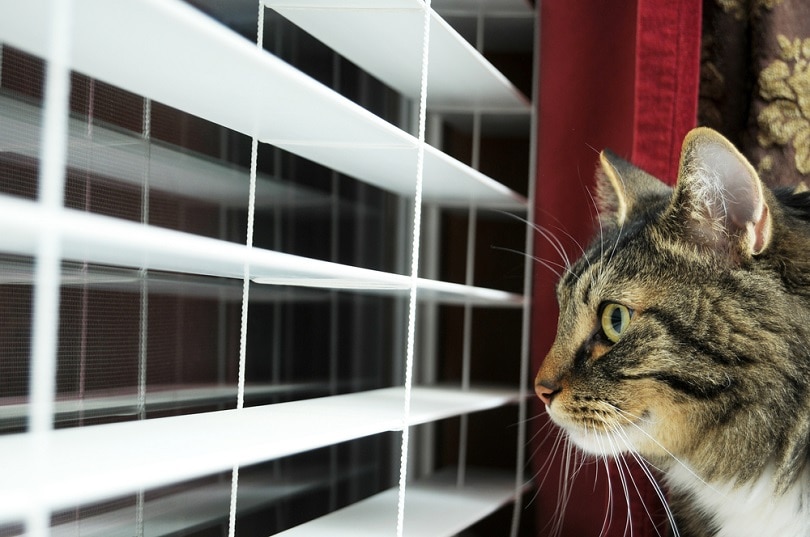
4. Avoid Perfumes and Fragrances
Maybe your favorite eau de toilette, the amazing vanilla scented candles, bathroom aerosol fragrances, or the strongly scented floor cleaners could be the factors causing irritation of your cat’s airways and triggering the asthma attack. Avoid any strongly scented substances around your asthmatic feline.
5. Recognize and Avoid Allergens
Mold, mildew, pollens, other animals’ dandler or feathers, dust mites, and certain food are all factors that your cat could be allergic to and that are triggering the inflammatory reactions and symptoms of asthma. Recognizing the specifics is the first step towards the management o the condition. Several asthmatic cat owners report their cats to stop suffering recurrent episodes after moving to a new apartment and later attributing it to mold presence in the old place.
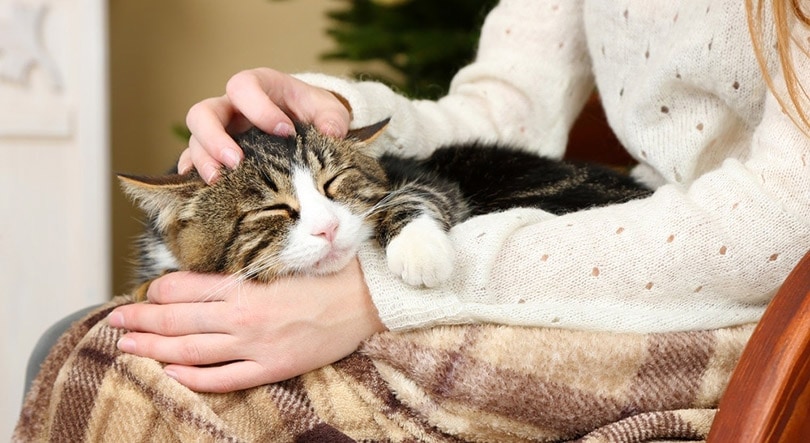
6. Cut the Carbs
Carbohydrates are not a natural diet for carnivore species. A cat’s diet should be based on animal-sourced proteins and fats with minimal carbohydrates. Carefully read the labels of your cat’s food and avoid any grains, such as wheat, corn, rice, oats, or barley. Avoid potatoes as well. As a general rule, wet cat food has lower amounts of carbohydrates than dry cat food but, if your cat can not live without its kibble, search for the lower carb options in the market.
7. Change the Protein Source
Many cats suffering from asthma benefit from a change of protein source. If your cat has been consistently on a chicken or fish diet, try changing the diet to a new protein. Gradually introduce a rabbit or duck diet. Give it a couple of months on a diet exclusively of this new protein to see if the sensitivity to the previous protein might have been behind your cat’s asthma.
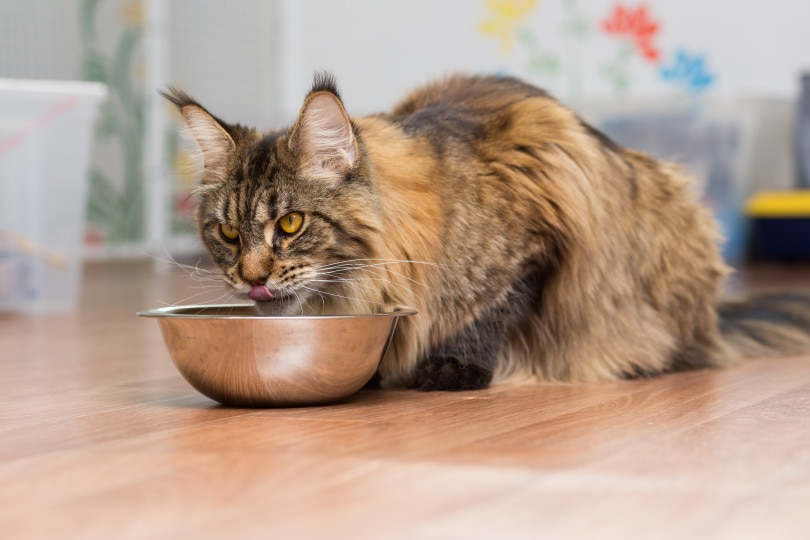
8. Honey
Raw, unpasteurized organic grade honey is very beneficial. Its anti-inflammatory, antioxidant, and antibacterial properties can help reduce swelling and soothe your kitty’s respiratory symptoms. One quarter to half a teaspoon twice a day can benefit an asthmatic kitty.
- See Also: How Much Does Cat Asthma Treatment Cost?
9. Omega Fatty Acids
Due to their anti-inflammatory and antioxidant properties, omega fatty acids are beneficial to a cat’s overall health. Some experimental studies using omega fatty acids combined with Luteonil as a regular prophylactic supplementation proved beneficial on the airway responsiveness test performed in cats with experimentally induced asthma. Regular supplementation with omega fatty acids will benefit your asthmatic cat. It is essential to give these fatty acids in fish oil instead of flaxseed as cats can metabolize them easier. 500 mg per every ten pounds of body weight is a standard daily supplemental dose for a cat.

10. Curcumin and Pepper
Curcumin/ Turmeric (Curcuma longa) is a member of the ginger family Zingiberaceae. This yellow-colored plant is popular uses as a spice, cosmetic, and its coloring properties. Curcumin is also well known for its multiple medicinal properties, including its anti-inflammatory and antioxidant properties. The ideal is 95% curcumin. You can offer 100 milligrams per every 10 pounds of body weight daily during a feeding session.
11. Air Filters and Ionic Air Purifiers
Clean air will significantly benefit your asthmatic cat by breathing cleaner air. Add air filters, clean and check air conditioners, and use ionic air purifiers to improve air quality and reduce airway irritation and inflammation. This proven method has helped reduce flare-ups in many asthmatic patients, humans and animals alike.
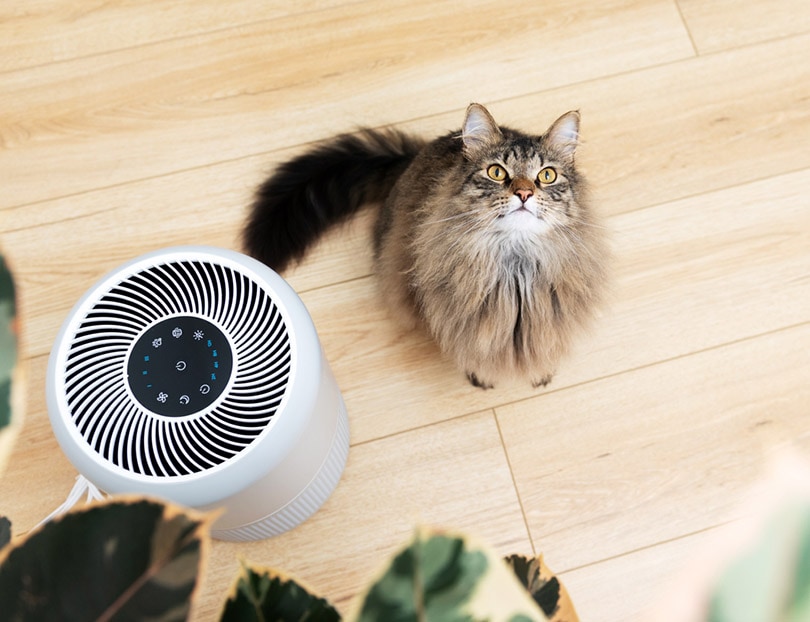
Conclusion
Learning to recognize and avoid potential allergens and triggers can go a long way in helping reduce asthmatic attacks. Emergency asthmatic flare-ups are life-threatening and will require the use of traditional corticosteroids and bronchodilators, and these should always be handy if you have a cat suffering from feline asthma.
Some supplements with anti-inflammatory properties can be very beneficial for your cat, together with a change to a species-appropriate diet that is high in a novel animal protein source and low in carbohydrates.
You may also be interested in:
Featured Image Credit: natata, Shutterstock








